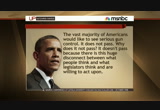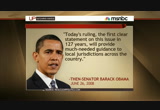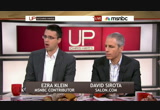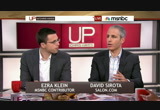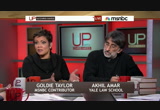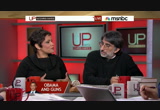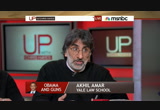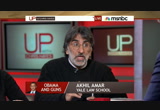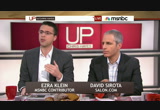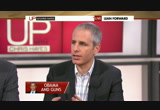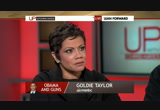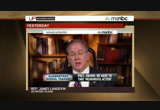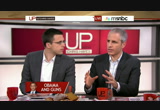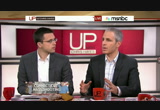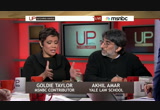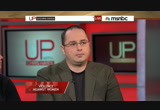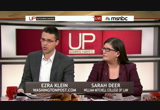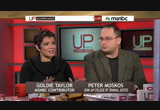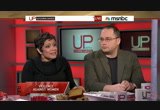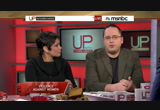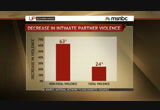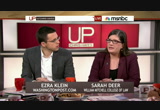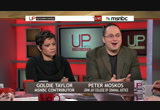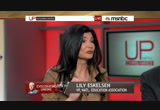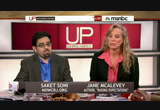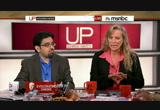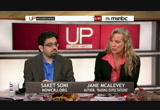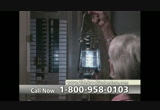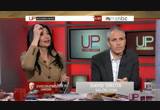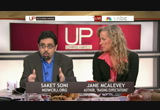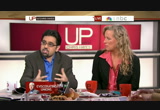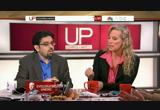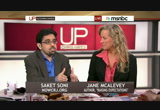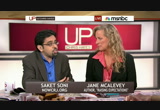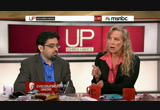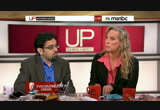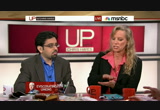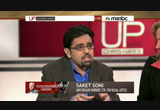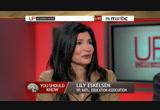tv Up W Chris Hayes MSNBC December 16, 2012 5:00am-7:00am PST
5:00 am
and the reporting has been difficult and i thought, my wife and i were having this conversation yesterday just about things that we thought we knew that we didn't know. the wrong name of the shooter, initially. and if you go back and look at early reports on katrina or reports from 9/11 or early reports of ben gazi, in the midst of this sort of horrific incident it's hard to piece the facts together so everything we're saying today we're giving you the most recent confirmed reporting we have and trying to be very specific and cleerp abo clear what we know and what we don't know. one thing that increasingly becomes clear is that this weapon was guise. and it's the same weapon, a variety of that weapon is used by military forces. it was the same weapon, a variety of which was used by the d.c. sniper and the image, i think, of this person armed for combat with this long rifle,
5:01 am
with 5 and 7-year-olds on the other side of it, i think, is going to heighten the intensity of the political debate of guns in the wake of this. and there's already article. a "new york times" article today about michael cooper about what will happen with the gun debate. we've had sorts of stories written after abby gifford was shot. it seems like something has changed but maybe it's because of the moral obscenity that it's so past anything conceivable. and so, i wanted to trace for a moment, as we're thinking about where the white house is going to be on the. everyone is talking about the president, where the president has been in the past. what the trajectory of his stance on this issue is. he's moved in one direction and
5:02 am
quite directionally without much wavering back and forth. as a young politician he was in the area of the country with some of the strictest gun safety regime in the country and incredible political constituency for that. he was a strong advocate. in 1996, when running for state senate illinois when asked, do you support legislation to ban the manufacture, sale and possession of handguns and he answered, yes." later a staff in 2007 of his campaign told politico a staff member had answered that question for him incorrectly. during a 1998 conference and loyola university of chicago state senator obama said this about state support for gun control. the vast majority of americans would like to see serious gun control. it does not pass. why does it not pass? it doesn't pass because there is this huge disconnect between
5:03 am
what people think and legislators think about are willing to act upon. >> the 2000 editorial for "the height park herald" he wrote those of you familiar with my record know i've consistently made gun control one of my top priorities and it's absolutely critical that we pass gun control at the state and federal level. i h work on guns for violence prevention. and then in 2008 when senator barack obama was running for president, a landmark decision was handed down by the supreme court. it really up-ended the previous juris prudence on the second amendment and and then senator barack obama on the campaign trail said today's ruling, the first clear statement on this issue in 127 years will provide much-needed guidance to local jurisdictions around the country. keep in mind this was a ruling that was absolutely devastating to the entire community of people who are activists on this
5:04 am
issue for this. that's the trajectory that we've seen so far and i want to start out by saying, where do you, at the table, see it going from here? >> not that quickly. i think this is different. a genuinely think this time is different. different than aurora and i think it is different because we've had so many happen so quickly. but for all the reasons you laid out, i think there's a very clear idea of what to do. that's one of the tougher problems they'll have to face. it was great reporting by charlie savidge at the "new york times", that the justice department wthinking about how o do background checks and how to make some of this more stringent in 2011 and they shelved it, he implied, due to the election. so stuff like that could come off the shelf but with the house republican majority and a deep fear of these issues among democratic politicians. and finally, i think, a sense of
5:05 am
confusion. what could you do thark that would work? gun control? mental health? background checks? changing what kinds of guns you can buy? i think what we can hope for is a very again win conversation moving towards solutions. but i don't think they have anything to take off the shelf that's ready for this moment. >> when congressman mccarthy said she has a bill. >> she does but i don't think the obama administration knows what it thinks it should do yet? i think you'll see movements in state. >> on the friday morning of the shooting before it happened, really, the quote was on thursday, the front page of "the denver post" in colorado was that the governor of colorado said we need to have a debate in the legislature over gun control. six months before he didn't want to talk about it and now he says now's the time to talk about it after the aurora shooting so what you might see, in lieu of the white house actually saying here's a federal policy, you may see a number of states, at
5:06 am
least, even in a pro gun state like colorado. i was surprised to her him say the legislature needs to have a debate. i should add upon the news that new democratic speaker of the house in colorado said the problem is, how do you define an assault weapon? how do you define this and that. i'm not saying they don't want it to go forward because i don't know. but the point to your point is that democrats, i think, know they want to do something. it's what exactly should we do? >> i think there are a set of solutions to be had here. they both have to do with a weapon and with the human involved in this. so there are a couple of things. you got to close the gun show loophole. 40% of guns sold in this country are sold without background checktion or identification through private sales. you must do that today. the second thing is crackdown on illegal guns.
5:07 am
the vast majority -- gun violence in this country happens with guns obtained illegally. the sentence for possession of an illegal gun is about a year. i say you make it a mandatory ten. >> totally disagree, continue. >> but i think -- you know, people are dying. because illegal guns are being -- i can walk out of here and 15 minutes from now i can get myself a 9 millimeter. it takes me a more difficult time to get through airport screeners. you know? to get touched up and pushed down and understood who i am and providing positive i.d., then it is for me to get a handgun in this country. i'm a gun owner. will be until monday morning, but you know -- >> you're giving it up on monday? >> why? >> because there's another thing that says even legal gun owners, we're more likely to hurt ourselves or someone we care about or someone we care about is more likely to get ahold of
5:08 am
that weapon and use it against us or you know, someone in the household. that's what happens primarily with private ownership. >> we had jay i can on yesterday from "new yorkers against gun violence" and she made this point which i make every time we talk about it, 35,000 or less more gun deaths a year. the solid majority are suicides and we think about gun violence in the context of the shooting on the streets of chicago and that's a big part. the majority are suicides and those are happening that could be with the right intervention, could be prevented and if the gun isn't there, some other much less lethal method might be used. there's a risk to the gun owner of having a gun in the home. akilla, walk us through in this new juris prudence landscape. a new order handed does by the seventh circuit. what would pass constitutional muster. the first is what policy do you want and then the open line of question, it's a open line of
5:09 am
cases that just started about what is the constitutional under the court's new conception of the second amendment. we'll talk about that right after this break. for those with visions of doing this... ...this... ...and this, dancing in their heads... ...we have these. home depot gift cards. give the gift of doing, in-store or online. have led to an increase intands clinical depression. drug and alcohol abuse is up.
5:10 am
and those dealing with grief don't have access to the professional help they need. when you see these issues, do you want to walk away or step up? with a degree in the field of counseling or psychology from capella university, you'll have the knowledge to make a difference in the lives of others. let's get started at capella.edu ♪ many hot dogs are within you. try pepto-bismol to-go, it's the power of pepto, but it fits in your pocket. now tell the world daniel... of pepto-bismol to-go. something this delicious could only come from nature. now from the maker of splenda sweeteners, discover nectresse. the only 100% natural, no-calorie sweetener made from the goodness of fruit. the rich, sweet taste of sugar. nothing artificial. ♪ it's all that sweet ever needs to be.
5:12 am
discussing gun safety debate in the wake of the horrific shooting that happened in connect without and what i think will be initable political pressure to, quote, do something. that's what happens in the wake of horrible tragedies, often. and what that somebody is going to be is doing to be an interesting political story to follow and what that something is going to be is going to be constrained by the court's views of the second amendment. i want you to talk about what do we think, based on what the court has said, policy makers will able to do and not do? >> there's really three different constitutional provinces here.
5:13 am
we've been talking about the second amendment. strictly speaking that combines the federal government and dk and other federal enclaves. when the heller case which recognized the individual right under the second amendment came down, the quote we had from barack obama talked about guidance to local jurisdictions so what's up with that? what's up with that is he's a constitutional law professor realized the next step would be the 14th amendment issue, which is applying this individual right to have a gun and announced in heller to state and local governments. >> i'm going to say that obviously, the amendmentment is congress won't make a law and we see it play out with mf of these things that there's a fires federal test case. the idea that if the principal exists for federal law we'll incorporate it to states and states can't make a law that violate this is. >> the original bill of rights reflected fear of the central government the entire bill of
5:14 am
rights is about congress and the federal government. after the civil war, a new bill of rights, basically emerged saying that states have misbehaved and we need to regulate them. they have fundamental rights. the language is no state shall make or enforce any law. we shall embrace the privileges or immunities. what are the privileges and immunities? prespeech, free press, free -- and guns in homes in heller, in barack obama's hometown, chicago, a case emerged that rose to the supreme court and by 5-4, the same vote as heller, the justices said the individual right to have a gun under the second amendment we announced in heller that's true for states and localities too. so that's the second constitutional provision. and then there are state constitutions to think about. 40 state constitutions, at least, according to adam winkler and other scholars affirm an individual right to keep and
5:15 am
bear or carry arms outside of the military context. so even if the state wants to do something and the federal government doesn't intervene. >> it has its own constitution. and i think one of the things that's very unclear is something like the assault weapons' ban which us was a signature piece of gun safety legislation passed in the clinton years and allowed to expire after george w. bush said he won't allow it to expire but he did. that's important to remember that it's unclear, i think, would you say, whether that would be upheld, the assault weapons' ban by this five-vote majority in the supreme court? >> all the supreme court has said thus far is there's a core traditional right to i have a gun in the home for self protection. now, the big issues going forward are going to be carrying g guns outside the home whether their concealed or opened or whether the state can absolutely prohibit that and whether it can
5:16 am
regulate the kind of ammunition, the size of the clip -- >> everything you're saying we do not know, right? this is all sort of unplowed terrain and there haven't been a lot of test cases because it hadn't been like legislators and the country are rushing to pass new gun safety laws. >> that's the key of this for a while. my understanding of heller and from talking to you as well on the, is that the distance between what we think the court will permit and what politicians have been willing to do for about the last decade, is vast. it is possible that there are -- >> you're saying primary obstacle is not a kons tug p tugs one it's a political up with? >> it's levied in order to kre eye -- it's not warranted in terms of what. politicians are willing to do. after the '94 election with the history and david knows better. democrats came to the belief that the gun issue they were not getting that far and it was destroying them in rural america. and they backed off of it pretty much entirely and you see it nationally and you see it in president obama's sort of transition here. there's a lot we can do and gun
5:17 am
show loophole that we don't expect will be in any way, obstructed by the court. we're not anywhere near going to the limits they've given us. >> and ironically, the fact that the court has affirmed the core right to have a gun in the home for self-protection could make other kinds of gun regulation easier because the argument is, this won't be the first step on the slippery slope to total conmico confiscate this. >> we'll take a break. sults as effective as a $200 system. guaranteed or your money back. olay pro-x.
5:18 am
hi, i'm ensure clear... clear, huh? i'm not juice or fancy water. i've got nine grams of protein. that's three times more than me! [ female announcer ] ensure clear. nine grams protein. zero fat. in blueberry/pomegranate and peach. that was me... the day i learned i had to start insulin for my type 2 diabetes. me... thinking my only option was the vial and syringe dad used. and me... discovering once-daily levemir® flexpen. flexpen® is prefilled. doesn't need refrigeration for up to 42 days. no drawing from a vial. dial the exact dose. inject by pushing a button. flexpen® is insulin delivery... my way. levemir® (insulin detemir [rdna origin] injection)
5:19 am
is a long-acting insulin used to control high blood sugar in adults and children with diabetes and is not recommended to treat diabetic ketoacidosis. do not use levemir® if you are allergic to any of its ingredients. the most common side effect is low blood sugar, which may cause symptoms such as sweating, shakiness, confusion, and headache. severe low blood sugar can be serious and life threatening. ask your healthcare provider about alcohol use, operating machinery, or driving. other possible side effects include injection site reactions. tell your healthcare provider about all medicines you take and all of your medical conditions. get medical help right away if you experience serious allergic reactions, such as body rash, trouble with breathing, fast heartbeat, or sweating. with flexpen®... say good night to vial and syringe. ask your doctor about levemir® flexpen. covered by 90% of insurance plans, including medicare. find your co-pay at myflexpen.com.
5:20 am
♪ don't know what i'd do ♪ i'd have nothing to prove ♪ i'd have nothing to lose [ male announcer ] zales is the diamond store. take up to an extra 15 percent off storewide, now through sunday. discussing the political landscape for gun legislation and movement on that, david? >> there's a couple of things about whether we'll see a challenge to these constitutional issues from the state. first of all i think the fact that since the democrats turned away from gun control in the mid to late '90s, they've lost more
5:21 am
and more of the south to the point where i think the 2012 election was this moment where i think a lot of people in the party said, listen, we can actually move forward completely without the south. that the republican party is a southern party. gun rights are a big political deal. they're a big political deal in a lot of places but in particular in the south. if the democratic party perceives itself to be a party that can exist without the south, then it becomes more empowered to actually push gun laws at the state level. >> the obama collision, this is really important point, the obama collision is liberated from having to win tennessee which if al gore won he would have carried the election in 2000. his support for soft weapons ban means he didn't win at home and blah, blah, blah. the obama coalition, they're not as dependent on the kind of votes one would win. >> the up with thing i would say about that is that in a lot of
5:22 am
swing states including where i'm from in colorado, the gun debate is still so polarized. i talked to callers every day on a right-leaning station. and the callers when you talk about gun control, or you caulk about the guns in the wake of a wake ofity connecticut shooting you'll get8 of 10 carrolls sayi if only there were not more guns in schools. if only this was a gun-free zone. don't take my gun away from me as a law-abiding citizen in order to deal with these people out there doing these horrible things. >> you wrote a piece about this about the decision to give up your gun and about a context. i want you to talk about the full context for that. because it was very moving to me and also, i think, the psychology of this is important. i don't want to underplay or sit here as aa never having owned a gun liberal and poopoo the psychology of people that do own
5:23 am
it. that's not something christmas eve subjective access to and a lot of people feel very strong about that. >> i live in the south, ground zero for the nra but further to the right of gun owners of america. it's a part of our culture. i was raised in a household with guns. my mother later on when she was a widow, had guns. my father was my first hero. and i describe in the piece, i think, for the first time publicly, how he was murdered. and it was not an ak-47. it was not a bushmaster. it was a 22, four bullets to the head. 20 years later, my brother krystofer, we're just a few months apart in age, he was murdered in a remarkably similar fashion. both of them were gun owners. neither of them had an opportunity to defend themselves. they were ambushed. so as a growing person and
5:24 am
joining the marine corp, we were taught, everything about weaponry there is. i left the marine corp and have owned a gun nearly every day since. one, because i was a single mother. and with small children in a home and just me and not living in the most desirable neighborhood, i slept near the front door. i was raised in east st. louis and sleeping near the front door was a thank you did. so i did that with a gun under the cushion of the couch. because if anybody were coming into that place on my children i was going to be prepared. so the gun was clean, loaded and locked with me. so that's how, you know -- >> did it make you feel more secure? >> it did. >> both an emotional feeling of security that you don't get from any other thing. not from a bolt on your door or
5:25 am
for a double locks, you don't get this kind of -- and there's a bravado that comes with it i have to tell you that gets -- that becomes a trigger later on. i decided, my children are grown. they're all in their 20s. and i decided for myself, looking at some of the other statistics out there, that that gun is more likely to be used on me. >> right. >> than anyone else and i'm the buyer. and then when i look back at how my father and brother were murdered, illegal handguns, the gun that killed my brother was used three years later for a murder in texas. and they followed this gun around the country. i think this gun is still in use. you know, all these years later but at the end of the day we've got to crackdown on illegal guns. there are guns out there that just simply should not be used, should in the be allowed for personal use. if we can regulate poisons, you know, consumer products.
5:26 am
i can't get certain sinus medicine over-the-counter. if we can regulate those kinds of products why can't we regulate the most dangerous product out there? >> that's a strong point. >> and that used to be the ncras position way back. they used to lobby the tougher gun laws and now, essentially the nra works to undo it own legislation. >> there's political pressure now to do something and the question that something brings us to, i think, what i see the very beginnings of are political talks to address what happened on friday that are deeply disturbing to me and i want to state an early intervention to nip that in the bud after this. i thought i'd start the video
5:27 am
by showing you the apartment building where the fire was. when things like this happen, i think you find a new perspective on life. red cross put us in a hotel so we were able to stay together. we're strong and if we overcame that or if we can overcome that... we can overcome anything. [ sniffles ] ♪
5:29 am
anyone have occasional constipation, diarrhea, gas, bloating? yeah. one phillips' colon health probiotic cap each day helps defend against these digestive issues with three strains of good bacteria. approved! [ phillips' lady ] live the regular life. phillips'. so there can be political pressure to respond to the tragedy and one thing i see
5:30 am
playing out and i've started to see it and if you look at the way the virginia legislature responded to virginia tech where you can't do anything about guns. the policy there, there was a focus on mental health. focusing on the mental health policy is great because it's an absolutely underinvestigated area. and i should state for the record we know nothing about the mental health profile about the pepper in question in this case and what interventions conceivably could have worked, et cetera. but there's a way to think about this that is extremely troublesome to me and we had congressm maman jim langevin an this is something the congressman said that i was sitting at my desk working on scripts and mary ears perked up. take a listen. >> we need to look at mental health issues and early intervention and programs working with the united states secret service who are clearly experts at identifying threat situations and how to prevent
5:31 am
them. >> working with the secret service who are clear live experts at identifying threat situations and how to prevent them. i can absolutely see because of the politics involved, and because of the way we've accustomed ourselves to think about security post 9/11 which is okay, here's what we need to do. we need to created a whole new profiling regime to keep track on people with diagnosed mental illness and essentially follow them around like suspect eed terrorists to make sure they don't do anything like this. it's a chilling thought and it doesn't seem like a productive policy but i can see that being a very appealing policy because it kind of threads the needle that's on the table which is do something, don't do something. >> except there's one thing but i agree with you about the nature of it. this is how we deal with it. more surveillance and more big government in that sense. the issue with it will be politically, i think, the
5:32 am
profile is white men. the profile, that's a profile that's not essentially in america, allowed to be profiled. that's the one profile in mooirk that's not allowed to be profiled. if this was any other kind of demographic, you would be hearing that i think, in a might have different way. a much more uglier way. >> i said yesterday, the name of the guy that did it, if it was -- every discussion is completely different. >> all i'm saying is i wonder if that is the way to politically thread the needle. will you see the same reaction from the republican party back when there was the department of homeland security report came out raising flags over right-wing militias and veterans are sometimes susceptible from appeals, and the republicans said, this is the way to demonize essentially, good god-fearing americans. >> so just to connect to the theme that you've and ezra bowe h both covered in other
5:33 am
segments, marijuana, you can have a criminal approach to it or you can have a medical approach to it or other source of drug addiction. and so i could imagine a mental health approach being a constructive one if it were a medical intervention approach. >> i agree but i think the macros that we have installed in our policy apparatus is you punch a key and the solution is criminalization. or get tough. that's the way that it becomes to deal with problems. >> but i think there are a couple of things about that. one, we have to train those people who are most in contact. school teachers, social workers, other community leaders, on how to spot and get -- and then -- >> there's been some success in that at the post columbine. >> and there's a lot more to be had. if we increase access, you know, not just to meaningful health care but meaningful mental health care quarterback the thing most stigmatized in the
5:34 am
american society. going to see a shrink isn't the thing you want to do. you don't want to profile people with mental infirmities. lion's share of people with mental infirmities don't harm anyone. >> of course. >> in fact, they are more likely to be harmed. >> yes. >> so i think -- >> that's very important to know. >> and i got this feedback over twitter. i put out, let's talk about depression and other things. immediate pushback that look here, we don't want to profile mental health patients because of that. >> and thanks to you both for being here. always incredibly lucid. why house republicans are blocking renewal of the violence against women act next. for those with visions of doing this...
5:35 am
...this... ...and this, dancing in their heads... ...we have these. home depot gift cards. give the gift of doing, in-store or online. to the best vacation sp(all) the gulf! it doesn't matter which of our great states folks visit. mississippi, alabama, louisiana or florida, they're gonna love it. shaul, your alabama hospitality is incredible. thanks, karen. love your mississippi outdoors. i vote for your florida beaches, dawn. bill, this louisiana seafood is delicious. we're having such a great year on the gulf, we've decided to put aside our rivalry. now is the perfect time to visit anyone of our states. the beaches and waters couldn't be more beautiful. take a boat ride, go fishing or just lay in the sun.
5:36 am
we've got coastline to explore and wildlife to photograph. and there's world class dining with our world famous seafood. so for a great vacation this year, come to the gulf. its all fabulous but i give florida the edge. right after mississippi. you mean alabama. say louisiana or there's no dessert. this invitation is brought to you by bp and all of us who call the gulf home. [ male announcer ] you've reached the age where you don't back down from a challenge. this is the age of knowing how to make things happen. so, why let erectile dysfunction get in your way? talk to your doctor about viagra. 20 million men already have. ask your doctor if your heart is healthy enough for sex. do not take viagra if you take nitrates for chest pain; it may cause an unsafe drop in blood pressure. side effects include headache, flushing, upset stomach, and abnormal vision. to avoid long-term injury, seek immediate medical help for an erection lasting more than four hours. stop taking viagra and call your doctor right away
5:37 am
if you experience a sudden decrease or loss in vision or hearing. this is the age of taking action. viagra. talk to your doctor. [ male announcer ] how could switchgrass in argentina, change engineering in dubai, aluminum production in south africa, and the aerospace industry in the u.s.? at t. rowe price, we understand the connections of a complex, global economy. it's just one reason over 75% of our mutual funds beat their 10-year lipper average. t. rowe price. invest with confidence. request a prospectus or summary prospectus with investment information, risks, fees and expenses to read and consider carefully before investing. we've been talking about the tragedy in newtown, connecticut. and that was not the only news story this week. one important story that was uncovered before the friday shooting. the future of women's under the
5:38 am
violence act. it provided billions of dollars to investigate violent crimes against women but it expired. they offered to expand the bill with a new protection for same-sex couples, american indians and undocumented immigrants. so the house balked so in tuesday at a rare show of defiance in their own party leadership ten house rips signed on to a letter written by democration asking house supremer john boehner and majority leader kantor to on the reauthorization of the violence against women act bringing a bill inclusive of all those protected by violence and similar to those that loor passed to the house floor for a vote. there must be a partizan bill to protect all those vulnerable. senate republicans that vote the against it say they are willing to support it but conservatives in the house remain opposed. the bill failed to reach the floor before the current congress left town. one of the major sticking points is a provision to give local
5:39 am
authorities on tribal lands the power to investigate and prosecute those that aren't american indians. right now they essentially have a jurisdiction-free pass. tribal authorities can't prosecute them and u.s. authorities often decline to take the cases. president obama prooirms promised to restore the authority to investigate, committee. >> with domestic violence so pref lernt prevalent on reservations wooir moving to push in. >> >> this is sarah deer and citizens of oklahoma who worked in the justice department's office of violence against women under the clinton and bush administration. and we have peter here, sarah,
5:40 am
walk us through this and why it has emerged? >> sure. in 1978, the u.s. supreme court ruled on a case called olifant. and what it means is that if your perpetrator is not a tribal member, the tribal government can't do anything to protect you and as a result we've seen a large result of crimes by nonindians because they know they're outside the law. >> the official jurisdiction is the local u.s. attorney for those crimes. but of course you're talking about a federal u.s. attorney and bringing them, saying with a domestic violence case and they have, quote, bigger fish to fry, is what it comes down to. >> exactly. i think we've seen some change in the u.s. attorney's priori prioritiation of this. so we've seen some change but it's until the case that a native woman can't rely on her
5:41 am
own government to protect her and that's what we're trying to change in the violence against women act. >> there's some staggering statistics on this. rates of rate and stalking by intimate partner and broken down by different demographic gripes and you see the rate is highest mooi american indian women, 46%, which is pretty staggering statistic. assault sexual, eyes cases from indian country declined by u.s. attorney's offices. 46% of assault cases are declined. 67% of sexual abuse cases are declined. ezra, what are the politics of this? this is one of these, it seems, in some ways, like this classic microcosm of art, our current dysfunction which is that this is traditionally been a very bipartisan bill. it's been reauthorized a number of times for bipartisan reasons and now isn't. and each side is saying the other side is essentially, specially politically loading the dice so that they can win a
5:42 am
win as opposed to getting the big passed. >> this remains a bipartisan bill. the is that version of bill, which is inclusive of native americans and illegal immigrants, that passed if i'm correct, with 68 votes. democrats did not have a 68% of majority. a fair amount of republicans, that's a very bipartisan bill. the house bill was partizan and it passed with have few or no democratic votes at all and in recent weeks y50i6r seen with the letter and a couple of other statements being made particularly upon republican for this but it feels like two sides were trenched in. you're not hearing the good argument and you're not furious about a provision, at least not most of them. they're upset and worried about the legal immigrant side. they think and it's kinds of striking argument, they think that there will be fraud in the sense that an illegal immigrant
5:43 am
would have somebody beat her in order to go apply for a temporary visa which is not an argument you'll hear publicly all that often but it is being made and it's a little bit, i think, frankly, stomach-turning. i think this will be a case where the republican opposition on this is currently and will crumble. but prior to the election when everything was gridlocked it wasn't. >> and i think part of the reason, also, is that it's flown underneath the radar. it hadn't gotten -- it's a difficult position and right now it's getting more attention. >> domestic violence doesn't have a lobbyist. we don't -- the statistics around this are maddening. that you know, every day, three women are killed by their intimate partner. the number one cause of death for pregnant women in this country is not the pregnancy. not other health care things. not even car accidents. it is homicide. being murdered by, typically, the child's father.
5:44 am
so if we look at issues like this and we can't come together as a nation, we need to check who we're sending to washington. wore who we ought to be bringing home. issues like this ought to be just straight forward. there are great organizations out there and one is men stopping violence, who go to re-educate communities, retrain men who have been on the aggressive side of these issues and women, too. according to statistics. but to say that we don't have the political will as a country, to step forward and protect the least of these, women who have been hit, locked in, beaten, stabbed, shot -- we can't do anything about that? >> peter, you were a police officer in baltimore and one of the things that's always struck me when i've been reporting and i've talked to cops, is how much
5:45 am
of being a police officer, a beat cop, is domestic violence calls? >> it might even be the majority of what you do as a police officer. >> it's a outside of clearing drug dealers offcorners it's a huge part. usually when cops show up there's been a fight and basically, cops arrest the winner. it's sort of a law of unintended consequence but the violence against women's act strongly encourage mandatory or pro arrest policy which mean if there's any sign of injury the cops arrest whoever is less injured. the problem is, mandatory arrest is increased domestic-related homicide, substantially. it doesn't work. so this is another case of well-intentioned policying going the wrong way when the rubber hits the road. >> i think you probably feel slightly different on that about the efficacy. this gets us to the deeper point about the first beat of this debate is extend the violence
5:46 am
against women act and expand its protections which seems very fair. but the deeper question is how we deal with domestic violence and whether the lens we use of get if you have and criminalization that's been used in so many other policy areas is being applied here and if there are drawbacks to that. we'll get to that question after this break. evere plaque psoriasis. i decided enough is enough. ♪ [ spa lady ] i started enbrel. it's clinically proven to provide clearer skin. [ rv guy ] enbrel may not work for everyone -- and may not clear you completely, but for many, it gets skin clearer fast, within 2 months, and keeps it clearer up to 9 months. [ male announcer ] because enbrel®, etanercept, suppresses your immune system, it may lower your ability to fight infections. serious, sometimes fatal, events including infections, tuberculosis, lymphoma, other cancers, and nervous system and blood disorders have occurred. before starting enbrel, your doctor should test you for tuberculosis and discuss whether you've been to a region where certain fungal infections are common. don't start enbrel if you have an infection like the flu.
5:47 am
5:49 am
according to the national network to end domestic violence, there's been an increase against women 51% income and a significant decline. this is about what you just said. we should adjudicate the ta statistics. they say there's been a decrease in domestic violence by partners and a 24% decrease in fatal violence. >> which is less than the overall decrease in crime. >> that's very interesting. i see. so that's a part of the factor that we've had this incredible
5:50 am
decrease in crime in that same period of time and intimate partner violence is a subcategory of that and that the decline in fatalities in that category is less than what it is in the broader category? >> exactly, exactly. >> what does the violence against women act do actually? we talk about it and it's a very large piece of legislation with a lot of moving parts. what does the bill actually do? >> i think what most advocates out there are familiar with are the funding. it applies a shelter program directly to the federal government and get 100,000 to $200,000 to set up a shelter program and make sure they're staffed and it created federal crime. if you violate a protection order as you cross state lines or in the travel communities that can become a federal crime. so it's given the funding piece of it but it's also tried to fill gaps and the last gap we have left is the tribal gap that's why it's so important that the senate version is the
5:51 am
version that ultimately passes. >> do you think that this model of mandatory arrest, which the law sort of incentivizes, basically. there's money for jurisdictions and it's a "race to the top" model. >> technically it's not mandatory but for a police officer it means the same thing. you don't take the chance. if there's an injure he'll arrest the other person even if they don't want the arrest. i arrested a woman once because she punched her man because he confessed that he was been unfaithful. when you take the discretion away from police officers you can make bad problems worse. >> although i think the case against that is that discretion in the past particularly with an overwhelmingly male police force was not a kind of neutral discretion. >> that's changed. that was a useful change from the idea that back in the '70s
5:52 am
and '80s when this wasn't considered a crime, that, i think, has changed. we're in a different generation. we accept that domestic violence is a crime. what are we going to do about it? it's the social funding that we need more of. tying the hands of cops and telling them to arrest everybody is always a bad idea. >> well, i think here's the really interesting thing. travel governments have traditionally had more of a restorative angle to their justice systems and law enforcement are often trained in the tribal perspective to work with the victims and work with their families. and if tribes are given that jurisdiction back maybe we can create models that could be applied in a mainstream american -- >> there's a lot going on in tribal governments and no one ever looks at that. >> goldie i'm curious what you think about this. >> i've been the woman standing at the door when the cops arrive afraid to talk. and because i could not talk, there was no arrest. it took me getting stabbed for
5:53 am
an arrest to be made, for him to have to show up in court. and then he pled down to a misdemeanor. and then an attempt clear attempt on my life. >> right. >> that man contacted me a few years ago on facebook. and i was still in his words, his princess. princess was battered, bruised, scared, 90 pounds. and there was no place in the justice system that i could go and get meaningful help that a restraining order is worthless. it is -- >> around what year is this this. >> this is in 1987. >> before the act? >> uh-huh. before the act. but even today when you see a restraining order come out, they certainly aren't abided by, police can't get there in time before something very bad really
5:54 am
happens. i think there are a couple of things that have to happen here. yes, there has to be reform on the judicial side. but there has to be a place where families can go to get help. where the men themselves with go to get help without stigma. >> yeah. and there's been a lot of -- part of what makes a violence against women act so important is the funding and to create this sort of association of services for this. navigating this system, my wife worked in the misdemeanor court in chicago and she was working as a victim advocate in the domestic violence part of chicago and navigating the system as a victim of domestic violence is just incredibly difficult. there is no one essentially standing in there for you. there is the prosecutor but the prosecutor's interests are not necessarily your interests. >> move the case. >> exactly. those are different interests. and so i want to talk about the
5:55 am
tension between taking this issue seriously as crime and, also, the fact that we just have this kind of arrest model that means that we're criminalizing larger and larger percentages of the population. we'll take a break. eat good fats. avoid bad. don't go over 2000... 1200 calories a day. carbs are bad. carbs are good. the story keeps changing. so i'm not listening... to anyone but myself. i know better nutrition when i see it: great grains. great grains cereal starts whole and stays whole. see the seam? more processed flakes look nothing like natural grains. you can't argue with nutrition you can see. great grains. search great grains and see for yourself. for multi grain flakes that are an excellent source of fiber try great grains banana nut crunch and cranberry almond crunch. a regular guy with an irregular heartbeat. the usual, bob? not today. [ male announcer ] bob has afib: atrial fibrillation not caused by a heart valve problem,
5:56 am
a condition that puts him at greater risk for a stroke. [ gps ] turn left. i don't think so. [ male announcer ] for years, bob took warfarin, and made a monthly trip to the clinic to get his blood tested. but not anymore. bob's doctor recommended a different option: once-a-day xarelto®. xarelto® is the first and only once-a-day prescription blood thinner for patients with afib not caused by a heart valve problem, that doesn't require routine blood monitoring. like warfarin, xarelto® is proven effective to reduce the risk of an afib-related stroke. there is limited data on how these drugs compare when warfarin is well managed. no routine blood monitoring means bob can spend his extra time however he likes. new zealand! xarelto® is just one pill a day, taken with the evening meal. and with no dietary restrictions, bob can eat the healthy foods he likes. do not stop taking xarelto® rivaroxaban without talking to the doctor who prescribes it for you. stopping may increase your risk of having a stroke. get medical help right away
5:57 am
if you develop any signs or symptoms of bleeding, like unusual bruising or tingling. you may have a higher risk of bleeding if you take xarelto® with aspirin products, nsaids or blood thinners. talk to your doctor before taking xarelto® if you currently have abnormal bleeding. xarelto® can cause bleeding, which can be serious, and rarely may lead to death. you are likely to bruise more easily on xarelto®, and it may take longer for bleeding to stop. tell your doctors you are taking xarelto® before any planned medical or dental procedures. before starting xarelto®, tell your doctor about any conditions, such as kidney, liver or bleeding problems. ready to change your routine? ask your doctor about once-a-day xarelto®. for more information including cost support options, call 1-888-xarelto or visit goxarelto.com.
5:58 am
hello from new york, i'm chris hayes with ezra kline. sarah deer, william mitchell college of law and goldie taylor. we're discussing the violence against women act which has run into a political road block and is set to expire unless there's congressional action. right now, the problem is that this senate version of the bill which has passed with bipartisan support, cleared the filibuster hurdle is not being passed in the house and not being brought to the house over basically, three provisions. a provision about the
5:59 am
jurisdiction for nonindian perpetrators on tribal lands and whether tribal courts can adjudicate them and can't prosecute them. increased protections for undocumented women and undocumented victims, i should say, not just women who are victims of domestic violence and lgbt victims. one thing we've been talking about is the model that deals with this and the kind of pro arrest policy of what was put in place with the violence against women act when it was originally past. peter is a former police officer and criminologist, you're somewhat skeptical of that. you were just over the break, telling ezra about some of the studies on this, about whether having this kind of automatic arrest policy when you show up to the door, actually helps with the problem. >> pro arrest policy was based on the minneapolis policy. since that study showed that
6:00 am
mandatory arrest was the answer, the problem was is that the author, larry sherman admits the study was flawed because cops were literally stacking the deck. instead of doing it randomly they did what they thought was best. it's been replicated with some results but consistently it shows that mandatory arrest is not the best solution, especially for the most dangerous repeat of violent offenders and what often is the best answer and the problem is it doesn't work in every case but as officer discretion. sometimes mediation is the answer. sometimes referral to social services is the answer. but the officer on the scene is not the perfect solution. but at least, it's one person from the outside who can try to help. >> for native women, sometimes we don't get nine showing up when we call 911, if we have 911. nobody comes or if they come three days later and by that time it's too late. >> i think one of the -- i know we're having a policy discussion but i think one of the things we've got to do especially in our community, the african-american community, is
6:01 am
remove the culture of silence. that there are statistics showing sort of the pervasiveness of this but i'm going to suggest to you that they're much higher. that even in our family, coming up, knew that the phrase was what happens between that man and that woman is between that man and that woman. that we didn't air our dirty laundry in the street so there has to be -- we have grassroots intervention on asthma. we have grassroots intervention on diabetes. and we're holding -- why not grassroots intervention on domestic violence? where women have a -- women and men have a safe place to go to get help? and maybe that means bringing an entire family unit in because typically, she isn't the only one being abused. it is the entire family. >> and one of the things that i think i -- one of the things about domestic violence is that at some level it's -- there's a certain simplicity to it about right and wrong and good and bad
6:02 am
but it's also tremendously complex on the ground which is what you're getting to. when you're dealing with adjudicating it. one of the political issues that's now risen is that the house version of the bill in their own kind of way of slipping a poison pill into the bill, they're calling for mandatory minimums for some forms of domestic violence and this is a way of for them, kind of this threading the needle and they're responding to the idea that they're blocking the violence against women act but this is something that democrats won't vote for because we've seen mandatory minimums as having really disastrous policy consequences. >> we know mandatory minimums whether it's -- drugs immediately comes to mind. it ends up just incarcerating a huge chunk of our population without solving the problem. some problems are not solved through incarceration. i don't know home times i have to tell people that. and no one seems to be getting the lesson. >> that's nonsense. >> but there's better ways to do it and these grassroots organization of social programs. stop thinking that putting someone in jail is the answer
6:03 am
because when they get out they're going to be pissed off. >> is one of the fears that people are articulating about the new provision in the law allowing tribal courts to prosecute nonend queen perpetrators is there a fear about what that would do in terms of precedents or what that jeerdal universe looks like? >> i think so. i think there's a lot of education that hadn't happened and we have a couple of house leaders with no indian country in their jurisdictions. so they don't -- they have, maybe, a mythology about what tribal courts do. this mysterious, unfair system. in fact, tribal courts are very fair and the fact that we can't prosecute nonindians is leaving a huge hole in our society. if we can educate the house leaders as to what tribal courts can and cannot do and we need the jurisdiction, i think we'll be able to help more victims. >> this is an ignorant question and i'll stipulate that at the
6:04 am
top. how much variance is there in the legal regime across tennessee courts? >> 566 federally-recognized tribes and each of them is their own sovereign and each of them has their own system and there's a variety of different approaches but a lot of tribes have very western zash style courts. would look like what a state courtroom will look like, albeit with less flair because we don't have the tax base to pay for very nice courthouses. but we're talking about educated judges. we're talking about, you know, fairness. talking about about due process. a lot of people don't realize that that's actually the case. they think tribal courts are somehow, outside the constitution. in fact, we do have our own constitutions and they're very consistent with what we have in the american system. >> and do you think that the -- you shounded in the previous block, optimistic that the house letter that was signed by ten
6:05 am
republicans, the fact that there was bipartisan majority in the senate meant that this, the violence against women act, was not going to die some sort of death of negligent over these issues? is that generally your feeling? that this is going to get done? >> i'm not going to say it won't last but i think, yes, over the next couple of months i think you'll see a resolution. that said, congress does surprise to the downside, it hasn't all the time. but i don't believe you'll have on this issue, a very extended period going well into 2013 in which you don't have a bill in authority. it has been long going negotiations between the house majority leader eric kantor and joe biden. they were productive and i think a lot of things went on hold for the election and now that the election is over there's still gridlock and anger and eventually i think something will happen but again, my reporting on this is somewhat -- >> ezra if it lapses does the funding for the social programs get cut cold turkey? >> what will usually happen in that scenario is they'll pass an
6:06 am
interim measure so the funding is extended for two weeks why they try to work out a negotiation or one month while they try to work out a negotiation. this is not how we run everything. >> exactly. >> not a great trend but it tends to be what they do in these situations although, again, i've not seen a violence against women act lapse before so it's possible something different could happen. >> sarah deer, assistant professor of william college of law. and peter, an assistant professor at john j. justice. ...and this, dancing in their heads... ...we have these. home depot gift cards. give the gift of doing, in-store or online. ♪ many hot dogs are within you. try pepto-bismol to-go, it's the power of pepto, but it fits in your pocket. now tell the world daniel...
6:07 am
of pepto-bismol to-go. i need you. i feel so alone. but you're not alone. i knew you'd come. like i could stay away. you know i can't do this without you. you'll never have to. you're always there for me. shh! i'll get you a rental car. i could also use an umbrella. fall in love with progressive's claims service.
6:09 am
6:10 am
finished and signed so on tuesday, michigan became the 4th right to work state, rushing through legislation that substantial i will reduces union power by banning unions from requiring workers to pay union dues and online onshops that pay yub onwages. go governor snyder adopted the argument that he's freeing workers from having to pay union dues. >> i hope this gives the unions an opportunity to be more successful. by having an opportunity that really have to listen to all the workers there. and say, why are they delivering a value proposition that workers can stand up and choose to joined? >> the latest wave of union setbacks to hit the midwest and states where organized labor is traditionally strong like wisconsin and indiana. this time, however, it happened in michigan, the heart lanlds of the american labor movement. a state that's long been the spiritual center of postwar moern unionism. governor snider is a smart enough politician to recognize how powerfully with his
6:11 am
constituents. parsing his words kierfully when he was asked about the right to work in february. >> the state legislature in indiana has recently and this is a state issue, taken up right to work. which is a controversial subject, as you know. governor snider, are think any discussions in your state concerning this type of action at the state level? >> it is under discussion. there are a number of legislatolegislator s that are are promoting i made it clear it wasn't on my agenda. right to work is an issue that's a very divisive issue. people feel very strongly about. it may have us time and place but i think it appropriate in michigan during 2012. >> not appropriate in michigan in 2012. not on my agenda, just signed into law. i'll bring in the executive director of the new orleans worker's center, rachel justice.
6:12 am
joined mcel fee, and she's worked with the afl cio among others. and vice president of the nation's largest union, the national education association. the question i want to begin with is -- why now? why is this happening now? >> oh, i know. >> please. >> this is a lot of political payback. there's a three-prong approach that the coke brothers and their illi it were are taking. it's all about winning something for them so up to say, corporations are people, meaning money is people. you have to vote suppress. when moms and grandmas and college students and minorities show up, the brothers lose. why did we see six-hour waiting lines? they understand that. the third thing, labor unions. where was the ground game for this?
6:13 am
where are the people that got people to the polls and did the phone calls? more than that, labor folks are your neighbors. one in every 100 americans is a member of the national education association. we live in neighborhoods that -- >> if you live in a big enough apartment building. >> you'll know somebody that's a teacher and works in a public school. >> right. >> so they are systematically saying, how do we dismantle something like a labor union? whenever anyone comes up to you and says, the koch brothers really care about working families there ought to be some alarms going off. >> i want to jump back historically. two things are true in this country. from world war ii until 1973, two things were true. one, more americans were members of unions than any time in this country and two, not surprisingly, wages were going up that entire time. in 1973, that change begins. one, in density or the number of people in unions begins to decline and secondly, real wages
6:14 am
begins to fall. so what happens in 1973? 1973, something called the business roundtable forms. a bunch of corporations that decide they want to roll the clock back to make this country work only for 1% of america and roll back the time of that middle class workers made and they begin a three-part deliberate plan. one, offshore the jobs in this country. that's a deliberate trade policy made in advance by the business roundtable. so suddenly you have an auto worker in michigan who had a decents middle class standard wage. not mike too much money, put up against a worker making $1 in mexico in factories. later burma and later china. so suddenly they have a narrative saying mooirn autoworkers make more money than people in mexico and china. those workers have no rights. ordinary citizens in those countries have no rights to change their traditions and now we have ap narrative saying american autoworkers make too mitch but they don't. and point two was to undo labor
6:15 am
law. regan came in 1981 and regan, as we famously know. >> let me stop you there on that nearive. undoing the labor lay starts much earlier. >> absolutely. >> i'm just trying to -- >> i know, but the 47 is when it really starts. to say what happens in '47. in some ways '47 -- the opening thing in this batting is really '47. >> i'll start at 35. no one understands how this works. >> hear that america. none of you understand this. >> gun safety and restoring american workers from a middle class standard it's all on a continuum. 1935, the national relation's act is passed. the mlra. by 1947, the taft hartley act is passed and that begins a systematic rollback of labor law in this country but it takes a while to work in the courts because the courts mike more and more increased rulings that effectively strip merp workers from having a right to form a union and it's in '73, so '47
6:16 am
taft hartley begins the attack. workers can no longer do solidarity strikes. >> explain that. >> it means that if the nurses and the hospitals say to the defend our patients we're going to wind up being taking a strike or do something, it means that the u.p.s. driver who is delivering can't go on strike in solidarity with him. workers literally in this country are barred from having solidarity. that's one. two, the second thing taft hartley did that was devastating and this is where american labor leaders need to change their own position is they said unions could only bargain over wages and weeking conditions. that is what began to break the connection between the american online ons and mean communities. they have to fight over the issues that matter to all laboring people in moerk to regain the hearts and k3w4r50ir7bds of american workers. >> i want to pick up there because there's a few things about the right to work in michigan. if they can do it in michigan they can do it anywhere. is this base waterloo? is this the ultimate defeat?
6:17 am
>> no. >> i want you to convince me that it's not. i want you to convince me that it's not after we take this break. every weekend. derrell hasn't been able to visit his mom back east in a long time. [ shirley ] things are sometimes a little tight around the house. i wasn't able to go to the wedding. [ emily jo ] since derrell couldn't get home, we decided to bring home to him and then just gave him a little bit of help finding his way. ♪ [ laughs ] [ applause ] i love you. i love you, too.
6:19 am
at legalzoom, we've created a better place to handle your legal needs. maybe you have questions about incorporating a business you'd like to start. or questions about protecting your family with a will or living trust. and you'd like to find the right attorney to help guide you along, answer any questions and offer advice. with an "a" rating from the better business bureau legalzoom helps you get personalized and affordable legal protection. in most states, a legal plan attorney is available with every personalized document to answer any questions.
6:20 am
get started at legalzoom.com today. and now you're protected. so i asked before we went to the break whether this was waterloo for the american labor movement. before answering that ke, can you explain what the provisions are? i'm not going to use the phrase that's commonly used. it's so ridiculous. let me give history. the phrase is coined by a guy named by vance muse, a oil industry lobbyist in houston, texas, in the 1930s, a white supremacist and segregationist. that's when the term is first brought into use. to fight against unions as sites of forced racial integration. the origin of this movement is an origin of a movement that the segregationist white supremacist south against the labor union as a site of forced racial integration. that's the genesis of this so
6:21 am
people understand where that phrase comes from and why i'm uncomfortable calling it by what it is. what does it mean and why has it hurt so much? >> i taught for 20 years in the great state of utah a right to work for less state. and we have a very strong union there. it's not a waterloo. the only thing that this provision and i agree, i have to think of something better to call it, too. it means if you're the recognized representative of these teachers at my school, the labor union has the obligation to bargain a contract for everyone. and in michigan, you could then charge people who didn't want to belong to a union, you could charge them a fee for a service you were required to give them. >> so the law says you have to bargain for everyone. >> exactly. >> the union has to by law bargain for everyone but then, in states in which it didn't pass, cannot essentially assess the fee of providing that
6:22 am
representation to everyone? >> it's the right of a nonunion member to get free union. >> a free ride? that's the best place to be is to be someone in a union shop with a union, paying people to bargain on your behalf and getting you higher wages, but not have to pay for it. that's the ideal situation. >> so how does this break a union or cause it to diminish the union? in my school almost everybody belonged to the union and paid their dues but there were always one or two people that went, i get this for free? i don't want to go on. >> we have to remember what a state is doing when they pass a so-called "right to work" law. a right-to-work law is the state using the power of huge government to intervene in a contract between an employer and their employees. if the union uses its economic power to say to an employer, we want you to agree to hire union workers and to then, when you
6:23 am
pay people, take out for dues, the state is actually saying -- you and the employer -- >> you can't have that contract between those two parties? >> chris, i would say instead of thinking about that as waterloo or i'll give for the labor movement i would say this is an opportunity, perhaps, the best yet, to think about the underlying causing and economic shifts that got working people in america where they are today. where they are working for more hours than ever for less than ever. and i would say that there are three big shifts that we need to talk about and organize around to really rebuild a labor movement in the 21st century. firstly, you know, you talked about the industrial era. the nature of employment has changed since the '30s. most employers have completely abandoned responsibilities for their workers. 42.6 million employees work contingent. part time, temporary, subcontracted. not directly employed. that's a third of the workforce who doesn't know who their boss is and they're saying you're not
6:24 am
working for us. we're not working for a real boss so we don't know who we're bargaining with. the second thing is while employment has changed so has unemployment. 40% of the work fierce unemployed has been unemployed for six months or more and that means them can't access the safety net. and thirdly the workforce has changed. 49% of the workers now are women. large and growing numbers of immigrant women documented and undocumented. people of color in the work force, growing service industry. we have to rebuild a labor movement out of these conditions. if anything, we need to strengthen the labor movement and build the power to beat the right to work not as a project in itself. but we need to, you know, start a whole new set of organizing and re-imagine the safety net in order to rebuild a 21st century labor movement. >> so the idea here and this is important which i'm getting from all three of you as someone, is that this is -- this hurts unions, obviously, but it is
6:25 am
surmountable. you're saying that goods organizing can overcome the legislative hurd? >> yes absolutely. i want to back up what you said and also say, look, part of the history lesson in this country is that it wasn't like being an auto worker in 1920 was a great job. what happened is unions came along and workers decided to fight collectively to make the auto sector a good job. the same thing has to happen right now and we need -- we went from an we've gone from manufacturing industrial economy to a service economy and it will take the same conscious, deliberate effort on the part of americans to get together and rally around the kind of production of low-wage jobs and form unions and cop vert the low-wage jobs. 7 of 10 jobs created in the next ten years are minimum-wage jobs. unions have to embrace climate change. have to embrace child career issues. they have to advocate for broad issues on behalf of the laboring class and rebuild the movement
6:26 am
by winning over the hearts and minds of american workers. >> it starts with re-imagining bargaining. >> hold that thought. but first we have a commercial. r removal has to be painful? challenge that with new olay facial hair removal duo. a two-step process that removes even coarse, stubborn facial hair gently. plenty of gain, without all that pain... with olay. hi, i'm ensure clear... clear, huh? i'm not juice or fancy water. i've got nine grams of protein. that's three times more than me! [ female announcer ] ensure clear. nine grams protein. zero fat. in blueberry/pomegranate and peach.
6:28 am
[ male announcer ] if someone asks what it feels like to drive a jeep grand cherokee, tell them it's like being nestled in an eight-way, adjustable, heated and ventilated seat surrounded by a 500-watt sound system while floating on a suspension made of billowy clouds. or you could just hand them your keys. ♪
6:29 am
♪ all right were bargaining and how bargaining can work if the 21st century. i think the trends we know, the assault on unions from the political right which as i said, started basically, stars as soon as the wagon act is passed in the 1930's and continues and is successful at picking apart the structure of the labor law at passing these laws in different states around the country particularly beginning in the american south how lisa myem mi north. you said you wanted to think about what bargaining looks like in the 21st century.
6:30 am
>> part of the question is -- what's the future of work in america? it's long term employment and the sourcing of workers from anywhere to anywhere. what would bargaining look like in that kanekoa texeira? what would organizing look this that context. we organized the neeshl guest worker alliance organized workers in a small factory in a town in louisiana and nobody had heard of this town before we organized there. nine guest workers who were sourced from mexico into a small crawfish factory, rose up and went on strike and they attempted not only to bargain with their immediate employer, but with walmart. because they were supplying crawfish to walmart's shelves. now, nobody listened to them at the time. nine days later, there were, in conversations, walmart through the pages of "newsweek." two months later they were on the cover of a magazines and in the editorial page of "the new york times." and now they're in actual
6:31 am
negotiations with walmart about supply chain conditions. these are the kinds of forms of bargaining we need to look at. >> the point is that's a bargaining process completely outside of the nlrb process. but there are two things being said that are in tension with each other. one is -- this is a huge attack on workers to pass right-to-work laws et cetera and the other is -- that's not is that important. what matters is organizing and you can have a strong union in a state that doesn't have mandatory fees assessed. so which is it? right? i mean, your union is probably the strongest union in the country in the states that have these kinds of laws. i think that's probably true, right? >> absolutely. we have strong affiliates in right to work states and strong affiliates in states that -- >> but if you can do it white can't others? what's the problem here? >> what they know is you'll have to spend an awful lot of time and resources in organizing. so what they'll do -- >> isn't that good? >> that's what we were talking about at the break.
6:32 am
we really have an opportunity now to be that value proposition and say -- >> you sound like rick snider. >> all right. didn't mean to do that. but there is something that says -- here's why you should belong to a union. and you have to be able to make a case to people. if it's on autopilot, maybe you've even forgotten how to articulate why it is, not just important to my school employees but why is it important to the families and the kids that are -- >> you are making a radical pro labor argument for right to work. what you're saying is similar to rick snider. >> we're putting the best face on it. i think it's okay, we're going to make the best of it. i think to your point about organizing challenges, part of this does, i think, beg for a better labor enforcement mechanism. we were talking about personal perm attempts.
6:33 am
the prelance of the economy how do you organize that part of the economy. increasingly companies are relying on subcontracting their work to other companies which makes it difficult to organize across that. i would say some of that requires better labor law enforcement that says you can't do these kinds of things. >> but that's not enough. you can't stop at enforcement. you have to think aupt of the box about what the laws should be and about what the organizing model should be. first of all we need to tie people's direct bread and butter issues to the union and to issues of the workplace. if you don't have a union we're deeper in poverty. if you're a part-time worker you can't schedule daycare so you organize people around daycare about their immediate issues and as a union you can still do that. as a worker center we organize people around a host of issues that are outside of their workplace issues. secondly, you know, you can bargain with the employer. you can bargain with the boss of the employer and you can bargain with the state. >> wait a second. you can bargain unless they fire
6:34 am
all of you, which they can do. >> but we're talking about -- you're talking about bargaining in a broader sense. >> hold that thought. i want to hear you talk about bargaining after this break. >> okay. ...and this, dancing in their heads... ...we have these. home depot gift cards. give the gift of doing, in-store or online.
6:36 am
and you learned something along the way. this is the age of knowing what you're made of. so, why let erectile dysfunction get in your way? talk to your doctor about viagra. 20 million men already have. ask if your heart is healthy enough for sex. do not take viagra if you take nitrates for chest pain; it may cause an unsafe drop in blood pressure. side effects include headache, flushing, upset stomach, and abnormal vision. to avoid long-term injury, seek immediate medical help for an erection lasting more than four hours. stop taking viagra and call your doctor right away if you experience a sudden decrease or loss
6:37 am
in vision or hearing. this is the age of taking action. viagra. talk to your doctor. see if america's most prescribed ed treatment is right for you. i want to return to a point we were talking about during the break which is this. when we say "bargaining." we're talking about it in this very narrow legal construct and the truth is there's no reason why the current labor movement has to stay inside the legal framework that's been handed to it by corporations in a series of legal rulings. so the kind of bargaining you're doing in louisiana against walmart. the walton family, who owns walmart, now has more net wealth as a single family than the bottom 40% of incomes combined in this country. that's the change from '73 to 2012 in america and we have to turn that around and the wap to do that is to have the labor
6:38 am
movement say -- forget taft hartley. forget the narrow box of labor law. we'll go out and re-introduce ourselves to the 90% of american workers that don't have a union and we'll do it on issues like childcare on issues like immigration and issues like affordable housing and the mortgage crisis in this country and we'll start to bargain as the labor movement on behalf of wla boring people. i'm not talking about sitting down at a table. i was a official negotiator for unions for lots of years and we found creative ways to bargain for things so you begin to go out and relate to the broader community as labor. >> but bargaining is something you do when you have leverage from someone. bargaining is not what you do when you have no leverage. so the question is how do you get to leverage so you can bargain? >> here's how you get to leverage so you can bargain. in stanford, connecticut. they were forming unions in a none union environment. when wierp forming unions there about a decade ago almost no
6:39 am
worker had a union. so people say there's no leverage there. we created a bottom-up structure said said we'll talk to other workers and have the workers talk to their religious leader in the region about why having union matters. and then we'll have them all talk to their pta and little league and soccer coach and soccer mom and we began a broad based grassroots strategy to reeducate people about how we created good jobs in the country and the base came from the churches, sip goings, mosques, the parent-teacher association, little league and soccer fields we collectively formed an organization to begin to fight. that's leverage at the polls and leverage against the employers. it was a grassroots effort by a whole community rising up and saying, we have to create it by forming union and defending workers and forming union and we shifted an entire market in southern connecticut from nonunion to union in several years by taking that approach because we said childcare matters. affordable housing matters.
6:40 am
every issue. racism, resegregating public schools. it all meerts. take it up as labor unions and begin to bargain and create leverage and the community will begin to embrace unions and stand up and defend workers in the service economy. that's what we have today. >> i think that you're right. and i think that what we're really talking about your point of what a union is to people becomes more acute as more and more people have fewer and fewer ties to unions themselves. as the population gets older but there are fewer and fewer people who say my good and my grandmother, was a union member. there's a whole vacuum of there that says, a whole generation says -- i don't know what a union is. what does that even mean? >> that's right. there are places in the country where it's happening and this is not -- we're not creating the world anew. in new orleans, after hurricane katrina, there was a completely nonunion construction industry
6:41 am
and high levels of long-term unemployment didn't show up on the dol numbers because the way you show up is by applying for unemployment insurance. louisiana went right to work in '76. they had a 33% union rate in construction then. by the time 29 years later after hurricane katrina, they were down to 3%. and a group of unemployed people decided to build power to bargain with the state for a path way back into that iconic american construction job that was a path and a career ladder to the middle class. so what they're strategy was, not to simply bargain with contractors, but to actually bargain with the housing authority. and what they've won this year is a preconstruction mandatory collective bargaining agreement on a set of construction sites. they're now going to enter unions and they were all going to ride up career ladders and turn it into apprenticeship programs and good jobs. >> this is something that i
6:42 am
thought about which is -- if conservatives have used the states as laboratories to sort of go after unions, iet, progressives, could eyes the states as laboratories to strengthen online ons. there's stuff you can do at the state levels with domestic workers in california -- >> it's been a hugely wasted opportunity or opportunity not taken advantage of. if the right in union eyes they're republicans to wage a war labor needs to do a better job. >> look at the symmetry. what happens when republicans take over state house? they go right after the union. what happens when the democrats take over the state house? crickets. >> the commission has a dialogue about what to do -- >> you mentioned the domestic worker bill of rights. it passed in new york and it will pass in california. it's inevitable, maybe not the first time but maybe next year, in pennsylvania, the national guest worker alliance organized in the hershey factory, workers who were earning $1 to $5 an hour under five layers of subcontracting. they organized not against the
6:43 am
6:44 am
[ male announcer ] jill and her mouth have lived a great life. but she has some dental issues she's not happy about. so i introduced jill to crest pro-health for life. selected for people over 50. pro-health for life is a toothpaste that defends against tender, inflamed gums, sensitivity and weak enamel. conditions people over 50 experience. crest pro-health for life. so jill can keep living the good life. crest. life opens up when you do. campbell's has 24 new soups that will make it drop over, and over again. ♪ from jammin' jerk chicken, to creamy gouda bisque. see what's new from campbell's. it's amazing what soup can do.
6:46 am
we talked to you recently about washington and colorado's fascinating experiments with legalizing marijuana. one question we asked was whether federal officials would tolerate the new marijuana policy, perhaps the most liberal in the world. an interview that aired on friday, president obama told abc that prosecuting pot user is not a priority for his administration. >> do you think that marijuana should be legalized? >> i wouldn't go that far but what i think is that at this point, washington and colorado, you've seen the voters speak on
6:47 am
the issue. and as it is, the federal government has a lot to do when it comes to criminal prosecutions. it does not make sense from a prioritiation view for us to focus on recreational drug users in a state that already said that under state law that's legal. >> it does remain to be seen to what extent that sentiment will inform federal policy in washington or colorado. last week, we played a played a tape of kentucky senator mocking ashley judd running for the seat of mitch mcconnell. according to a poll released on thursday, judd would be the top choice and in a hypothetical maech, head-to-head, judd failed. and when the martin luther king structure was unveiled we described how one of the subscriptions was truncated so
6:48 am
it lost the full quote's sense. this week, is interior secretary endorsed the plan to remove the quote. the paraphrase on the monument has him saying, quote, i was a drum major for justice, peace and righteousness. the full quote is different. sermon, he said, if you want to say i i was a drum major for peace and justice i was a drum major for rye chiesness and all the other shallow things will not matter. the not matter. king's family endorsed the plan to remove the quote. there's a twitter account you should follow if you want to watch how we respond to technology and death and destruction. josh decided to start tweeting every u.s. drone strike. you can follow him on twitter@dronestream. you should know, it turned out ten minutes wasn't long enough.
6:49 am
he will keep going as long as the drone strikes do. the too big to fail that empowers those who run banks take legal risks. hsbc this week, agreed to a record $1.9 billion with a "b" settlement of money laundering with sanctions with iran and north korea. some prosecutors wanted to bring charges but the u.s. officials were concerned the consequence would cripple the bank in the u.s. hsbc executive said the bank was quote, profoundly sorry. before taxes, hsbc made $12.7 billion in profits the first half of this year, which makes it too big to prosecute. health care exchanged defined by
6:50 am
the affordable care act to get health insurance for coverage and affordability. they will require federal involvement. utah and florida are undecided. 22 states who oppose the president will rely most on the obama administration to make health care coverage available to the residents least able to afford it. finally, where unions stand with chicago mayor rahm emanuel. in the week his former boss la meanted in michigan, he switched a contract to a non-union contractor. 300 union members will lose their jobs. they are not guaranteed full time work, will not have full health care coverage. it's owned by a man described as a reputed mobster. republicans are open to
6:51 am
dismantling a labor force, democrats are perfectly willing to do their part, too. want to find out what my guests think you should know. >> i want to say that my daughter, kathryn has been accepted to teach for america. >> awesome. >> you should know she's wanted to be a teacher for all of her life and that dream is coming true. there have been 30,000 gun deaths in this country last year. according to the university of chicago, at least one in five children who are shot were not the intended target. so, you should know that there is collateral damage in this war happening in our streets. in the 24 hours following the tragedy in newtown, ten people were shot in chicago. you should know. >> 24 hours. jane? >> in the next week, aside from keeping our hearts and mind and support trained on newtown,
6:52 am
connecticut, you should know that we are staring down a future where seven out of ten jobs in this country according to the bureau of labor statistics will be poverty level jobs. how will we lift up children and families that are sort of on the slow-moving tragedy that's taking place in this country. seven out of ten jobs going forward are going to be poverty jobs in this country. >> you should know this is going to be a very, very hard week for teachers, for education support staff, for pins pals, moms dads and the kids. i can't talk about this without crying. it's just hitting us what's happened and the magnitude of what's happened. you should know that this would be a really good week to hug your kids, to tell them you love them and to hug a teacher, a school custodian, a principal, they were also people who died
6:53 am
trying to save those kids. >> some of the story that is have come out, again, facts are so difficult to come by that i don't want to get too far ahead. the reporting we do have indicates there were incidents of tremendous, tremendous courage. >> these teachers were union members. or not. it doesn't matter. we just love our kids. they acted -- they acted out of complete bravery because it was just something they had to do. whether they were union members or not. but, i have had friends who i haven't heard from in a long time, just give me a call because they know i'm a teacher. they say i know this is a tough time for you. it meant something to me. i wasn't expecting a phone call. if you know someone who could use a little love, send us your prayer, send us your love, we'll need it. >> david.
6:54 am
>> you should know when conservatives or anybody say that we shouldn't have a conversation about gun control or gun regulations or we are not allowed to have that conversation what you are being subjected to is the new form of pc police in america. the same people who decry political correctness against liberals and liberals use illegal immigrant or anchor babies, these same voices are out there saying we have no right to talk about sensible gun regulations. what you should know is that is then trying to impose a political correctness on you, that tells you to be quiet when it's your responsibility as a citizen to speak up. >> go google the gun that we think was the shooter was using when he murdered those children and think about that gun and whether it is a gun that should be distributed in america. i want to thank goldy taylor,
6:55 am
jane, author of "raising expectations and raising hell" and david. thank you for joining us. we'll be back next weekend. salon.com contributor glenn green wald will be here. next is melissa harris-perry is coming up next. prevents it obama administration from having the political battle it should be having. that's next. see you next week here on "up." look who's back. again? it's embarrassing it's embarrassing! we can see you carl. we can totally see you. come on you're better than this...all that prowling around. yeah, you're the king of the jungle. have you thought about going vegan carl? hahaha!! you know folks who save hundreds of dollars by switching to geico sure are happy. how happy are they jimmy? happier than antelope with night-vision goggles. nice! get happy. get geico.
6:58 am
neural speeds increasing to 4g lte. brain upgrading to a quad-core processor. predictive intelligence with google now complete. introducing droid dna by htc. it's not an upgrade to your phone. it's an upgrade to yourself. this morning, my question, what's the real reason susan rice is no longer under consideration for secretary of state? plus, the money behind michigan's antilabor law. first, the details on the school shooting in newtown, connecticut.
6:59 am
good morning. i'm melissa harris-perry. this morning in washington, d.c., flags remain at half mass to recognize the loss of those murdered on friday. president obama will head to newtown today to meet with the families of the victims. he's expected to speak at a vigil tonight. the tribute to those lives lost are growing as details continue to emerge. what we know now is suspected shooter, adam lanzas forced his way into the elementary school. he carried four handgun, had an assault rifle in his car. the names of the victims have been released. the 20 children killed, 12 were girls, 8 and boys all ages six and 7. all six of the adults killed were
331 Views
IN COLLECTIONS
MSNBC West Television Archive
Television Archive  Television Archive News Search Service
Television Archive News Search Service 
Uploaded by TV Archive on

 Live Music Archive
Live Music Archive Librivox Free Audio
Librivox Free Audio Metropolitan Museum
Metropolitan Museum Cleveland Museum of Art
Cleveland Museum of Art Internet Arcade
Internet Arcade Console Living Room
Console Living Room Books to Borrow
Books to Borrow Open Library
Open Library TV News
TV News Understanding 9/11
Understanding 9/11


